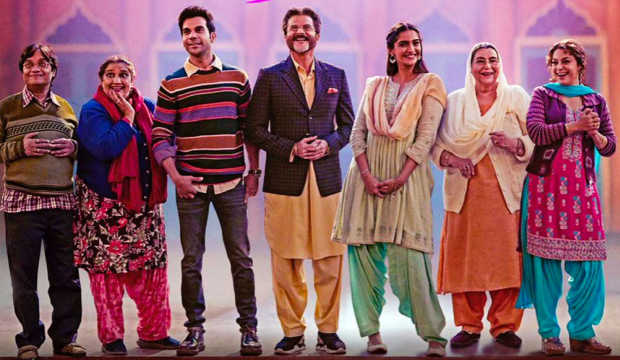
Suparna Thombare
Mumbai, 01 Feb 2019 15:17 IST
Updated: 06 Feb 2019 0:56 IST
Writers Gazal Dhaliwal and Shelly Chopra Dhar keep the drama to the minimum and focus on the core plot and its message.

When it comes to mainstream romantic comedies, most follow similar tropes, but what distinguishes them from each other is the central conflict and treatment.
"True love ke raaste me koi na koi siyappa (chaos) hota hi hota hai," says Sonam Kapoor's character during the first few of scenes of Ek Ladki Ko Dekha Toh Aisa Laga. And in this love story the point of chaos and conflict is the protagonist's sexual orientation.
Ek Ladki Ko Dekha Toh Aisa Laga is an important film in many aspects. For one, it is the first coming-out-of-the-closet story in Hindi mainstream cinema, depicting a lesbian romance. Secondly, it is topical as it comes close on the heels of 2018 order decriminalising homosexuality described in the Section 377 of the Indian Constitution. In this scenario, a majority of Indians are still coming to terms with its implications and the socio-cultural and emotional understanding of same-sex love.
Therefore, at this point, it becomes extremely important how mainstream cinema depicts homosexuality.
Director Shelly Chopra Dhar tells the story of Sweety (Sonam Kapoor), a girl from small town Moga in Punjab. While her family is desperately hunting a suitable groom for her, Sweety is planning go off to an art school in London. She bumps into struggling writer Sahil Mirza (Rajkummar Rao) in a theatre in Delhi while hiding from her aggressive brother (Abhishek Duhan) so she could get to her visa interview at the UK Embassy.
Mirza falls in love with Sweety quite instantly and follows her to Moga, but his hopes are shattered when she reveals to him that she is lesbian.
All through the first half, Sweety's secret is only hinted at. The big reveal comes only at the the interval point, and that makes you just a little impatient. Post the reveal, though, we get to see a same-sex love story unfolding just like it would in any other rom-com about two straight characters. Regina Cassandra has very little screentime, but her screen presence adds a lot to their scenes together.
The flashbacks portraying Sweety's pain growing up feeling different from the rest of the kids, being made to think she is abnormal and trapped, and the pressure from her brother to save the family's respect by never revealing her secret are handled maturely.
Screenwriters Gazal Dhaliwal and Dhar write a theatre presentation to explain same-sex love to Sweety's family and the small-town audience in the climax, a convenient device to use in this case.
The sequence where Anil Kapoor watches his daughter trapped in a glass box, pleading for help is one of the most emotional scenes in the film.
Perhaps his own struggles in trying to get his mother to understand his love for cooking (she considers it an effeminate trait), and being forced to live a life his parents dreamt for him, helps him identify with what his daughter may have gone through all these years.
Anil's performance as a father coming to terms with his daughter's sexual preference is the most effective one of the lot. And his scenes with Juhi Chawla, who is simply delightful in her role of the upbeat Chhatro, adds laughter to the proceedings.
At one point, Sonam's character urges Mirza to take the play to small towns and villages so he can educate people and save many more Sweetys.
That scene also explains why Dhar chose a simple rom-com treatment for the subject, and set it in a small town in Punjab instead of an urban backdrop. It stems from the fact that the director aims to make the story and its message palatable to a larger audience. It's also a step in the right direction to depict same-sex love just like any other on-screen love story.
While it touches upon the issues of growing up being different in a small town, the misconception that gay people are influenced by Western culture and the misconception that homosexuality is a choice, are all touched upon, but the complexities that come with it are never fully explored. It's a choice Dhar makes at the outset.
Carrying off an important character like Sweety is not an easy task and credit to Sonam for choosing to do do it. While the actress brings innocence, earnestness and grace to her character, she fails to connect at a deeper level. That would have happened with a more layered and nuanced performance.
The rest of the cast, including Rajkummar, Seema Pahwa and Brijendra Kala (house help), Madhumalti Kapoor (grandmother) add vibrancy to the proceedings.
The writers also keep the drama to the minimum and focus on the core plot and its message. The sexual elements, too, are kept out and the focus is on true love in this family film.
Ek Ladki Ko Dekha Toh Aisa Laga is a regular rom-com, a love story with a heartwarming resolution and a happy ending. Even though many in the audience are likely to squirm or get ruffled while watching this story unfold in the darkness of the theatre, it is still a quintessential family film. And that's its biggest win.
Related topics
Section 377You might also like

Review Hindi
Jogi review: Diljit Dosanjh-starrer is more like a thriller revolving around 1984 riots
The Ali Abbas Zafar film takes you by surprise with the riot angle brought in much earlier in the...

Review Hindi
Matto Ki Saikil review: Prakash Jha leads this sentimental saga of socio-economic inequality
Written and directed by M Gani, the Hindi film is a patchy yet heartbreaking look at the bleak class...

Review Hindi
Jhini Bini Chadariya review: A moving lamentation for the holy city of Varanasi
Ritesh Sharma’s hard-hitting film lays bare the social fabric of the city and the growing...

